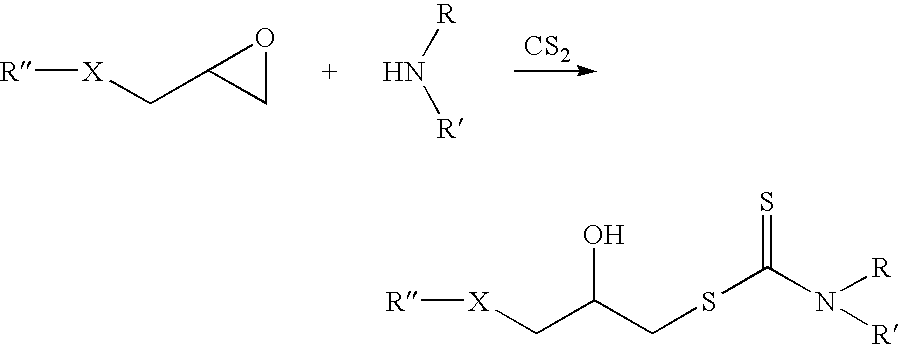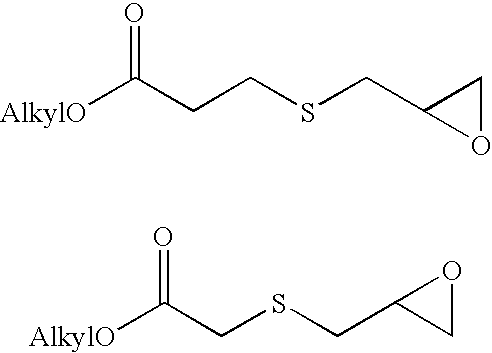Dithiocarbamates containing alkylthio and hydroxy substituents
- Summary
- Abstract
- Description
- Claims
- Application Information
AI Technical Summary
Benefits of technology
Problems solved by technology
Method used
Image
Examples
##ventive example 1
Inventive Example 1
A 1000 mL four neck round bottom flask is equipped with a mechanical stirrer, an addition funnel, a thermometer, and a reflux condenser cooled to approximately 5° C. Dry nitrogen is passed into the reactor through the addition funnel and out of the reactor through the reflux condenser. The reactor is chilled with an ice water bath and charged with epichlorohydrin (46.3 g, 0.50 mol) and tert-dodecylmercaptan (101.1 g, 0.50 mol). The mixture is stirred with cooling to approximately 5°-10° C. Sodium hydroxide (21.2 g, 0.53 mol), water (230 g) and tetrabutylammonium hydroxide (40% in water, 6.0 g, 6 mmol) are combined with mixing and slowly added to the epichlorohydrin and tert-dodecylmercaptan over a 1 hour period. An exotherm is observed and cooling is continued maintaining the reaction temperature between 5°-10° C. during the addition. After the addition the reaction is heated for 2 hours at 50° C. and cooled to 5° C. Carbon disulfide (40.0 g, 0.53 mol) is then add...
##ventive example 2
Inventive Example 2
A 2000 mL four neck round bottom flask is equipped with a mechanical stirrer, an addition funnel, a thermometer, and a reflux condenser cooled to approximately 5° C. Dry nitrogen is passed into the reactor through the addition funnel and out of the reactor through the reflux condenser. The reactor is chilled with an ice water bath and charged with epichlorohydrin (138.9 g, 1.50 mol) and 2-ethylhexyl 3-mercaptopropionate (327.6 g, 1.50 mol). The mixture is stirred with cooling to approximately 5°-10° C. Sodium hydroxide (63.0 g, 1.58 mol), water (700 g) and tetrabutylammonium hydroxide (40% in water, 18.8 g, 19 mmol) are combined with mixing and slowly added to the epichlorohydrin and 2-ethylhexyl 3-mercaptopropionate over a 1 hour period. An exotherm is observed at the beginning of the addition that causes the temperature to reach 80° C. The temperature is returned to 5° C. and cooling is continued maintaining the reaction temperature between 5°-10° C. for the rem...
##ventive example 3
Inventive Example 3
A 1000 mL four neck round bottom flask is equipped with a mechanical stirrer, an addition funnel, a thermometer, and a reflux condenser cooled to approximately 5° C. Dry nitrogen is passed into the reactor through the addition funnel and out of the reactor through the reflux condenser. The reactor is chilled with an ice water bath and charged with epichlorohydrin (46.3 g, 0.50 mol) and n-dodecylmercaptan (101.2 g, 0.50 mol). The mixture is stirred with cooling to approximately 5°-10° C. Sodium hydroxide (21.0 g, 0.52 mol), water (240 g) and tetrabutylammonium hydroxide (40% in water, 7.0 g, 7 mmol) are combined with mixing and slowly added to the epichlorohydrin and n-dodecylmercaptan over a 1 hour period. An exotherm is observed and cooling is continued maintaining the reaction temperature between 5°-10° C. during the addition. After the addition the reaction is heated for 2 hours at 50° C. and cooled to 5° C. Carbon disulfide (40.0 g, 0.53 mol) is then added rap...
PUM
| Property | Measurement | Unit |
|---|---|---|
| Temperature | aaaaa | aaaaa |
| Temperature | aaaaa | aaaaa |
| Temperature | aaaaa | aaaaa |
Abstract
Description
Claims
Application Information
 Login to View More
Login to View More - R&D
- Intellectual Property
- Life Sciences
- Materials
- Tech Scout
- Unparalleled Data Quality
- Higher Quality Content
- 60% Fewer Hallucinations
Browse by: Latest US Patents, China's latest patents, Technical Efficacy Thesaurus, Application Domain, Technology Topic, Popular Technical Reports.
© 2025 PatSnap. All rights reserved.Legal|Privacy policy|Modern Slavery Act Transparency Statement|Sitemap|About US| Contact US: help@patsnap.com



